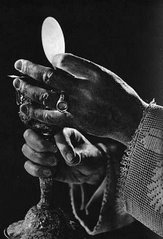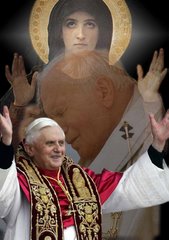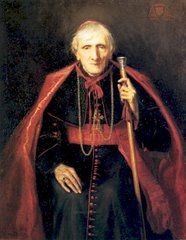As presented to the Parousians by Will Newman on Sunday November 5. Transcribed by Will Newman and Michael R. Denton.
The Problems Associated with evolution and the possible Catholic solutions
The problems of evolution can be classified into two broad categories: the exegetical and the theological. The exegetical problems are those seeming conflicts between the facts of evolution and the text of scripture, such as the order of creation, man’s descent from living creatures, and the age of the earth. The theological problems are those concerned more with doctrines of the Church, such as the Fall, Original Sin, Providence, etc.
Throughout the Bible, there are several revelations concerning creation. We are all familiar with the account in Genesis, but they also exist in Job and the Psalms. As Pope Benedict XVI reminds us in his book In the Beginning the normative Creation account for Christians is to be the one found in the Prologue to John’s Gospel. (In the beginning was the Word…) While this does not mean that Genesis or the other texts are dispensable to the debate (for no text of Sacred Scripture is dispensable), it means we must look at Genesis with John’s account in mind.
Also in reading Genesis we have to be careful that we are reading according to the proper literary genre in which Genesis was written and meant to be interpreted. Too often there is a division between the literal and spiritual interpretation of Sacred Scripture which suggests that spiritual interpretations undermine literal ones. This is only true under a misunderstanding of literal. A Literal sense ought not be confused with literalistic sense, which holds that Genesis is a scientific explanation of creation. Literal instead in the ancient sense means the message that the text is trying to convey, not a scientific account. So to discover the literal sense of a passage in Scripture we must first understand the genre in which it was written. There are many genres found in the Bible, including historical records, legal codes, poetry, prophetic visions, biographies, parables, and myth. Myth is not a fairy tale, or even legend or allegory. Myth might use allegorical, poetic, and symbolic elements but that does not make it only allegory, poetry, or symbolism. Instead, myth utilizes these elements in order to better convey theological, moral, prophetic, and even historical truths. It is with this in mind that both Pope John Paul II and Benedict XVI have at times used the word “myth” to describe the primeval history found in Genesis.
Furthermore it is myth which draws on and transforms the myths of the surrounding cultures, as suggested in Humani Generis. However, Pope Pius XII points out while there are similarities the ancient Hebrew authors, guided by the Holy Spirit, transformed the work in order to expound on the theological and historical truth. Benedict picks up this theme in In the Beginning. For instance, in the Babylonian Enuma Elish, which the sacred authors were familiar with, the universe is born out of the cosmic battle between Marduk and Tiamat. In Enuma Elish everything is created out of the body of a defeated evil dragon Tiamat, whereas in Genesis everything is created ex nihilo, or out of nothingness not from something else. In the Babylonian myth humans are created from the blood of the dragon Tiamat, suggesting an element of evil in human nature whereas in Genesis humans are created from dust.
It should be pointed out that this is not a simply a modern interpretation of Genesis necessitated by scientific discovery. Pope Leo XIII in his 1893 encyclical, Providentissimus Deus, points us to St. Augustine, who “warns us ‘not to make rash assertions, or to assert what is not known as known.’ If dissension should arise between them here is the rule laid down by St. Augustine, for the theologians: ‘Whatever they can really demonstrate to be true of physical nature, we must show to be capable of reconciliation with our Scriptures; and whatever they assert in their treatises which is contrary to these Scriptures of ours, that is to Catholic faith, we must either prove it as well as we can to be entirely false, or at all events we must, without the smallest hesitation, believe it to be so.” St. Augustine did in fact write a tract called “On the Literal Interpretation of Genesis,” which to our modern ears sounds like it could be a primer on creation science. Rather, St. Augustine differs from the literalistic interpretation in favor of the literal one. St. Augustine believes for instance that creation was an instantaneous event, not the 7 days, so that the seven days was not a chronological series of events but a topical rendering of the elements of creation in order of importance. While St. Augustine’s belief here does not mesh well with evolution, his method serves us well in that we prefer literal and not literalistic interpretations of the Bible and of Genesis specifically.
Having established that the Genesis as a myth relates historical and theological truths, we should note what those truths are. There are many, among the most important are that God created the world ex nihilo, that man in an original state of grace which he lost through disobedience. What is not taught is the “how” of creation, the timeframe of creation, the age of the universe, or the age of humanity. If the Church Fathers were unanimous on these issues, perhaps we could say that there is an Apostolic Tradition. However, they disagreed. On the issue of the length of creation, interpretations vary from St. Augustine’s instantaneous creation to Cyprian’s belief in 7,000 years to a seeming standard week for Basil the Great. Now, a number of Early Church Fathers believed the Human race to be 6,000 years old, but they came to this conclusion from calculations from genealogies not from Tradition. This belief was also not expressed in any council. It is worth noting that many who held this timetable used it as part of the larger framework of millenarianism which has been condemned by the church.
So while fundamentalists might raise exegetical objections to evolution, thanks to the methods of interpreting scripture laid down by thinkers like Origin and St. Augustine Catholics do not find evolution to pose insurmountable exegetical problems. Theological problems on the other hand are common to everyone who confronts this issue. There are four main problems: Providence v. natural Selection, the origin of the soul, monogenism v polygenism, and the fall & original sin (which includes problems like animal death before the fall, man’s original state, and the nature of original sin).
Before delving into the problems directly, it is useful to look at the guide provided by the encyclical Humani Genesis. Pope Pius XII in responding to many of the ideas of modernism wrote Humani Genesis. It said that the body may have its origin in preexisting & living matter, though it developed through the guidance of providence. He wrote that the Sacred authors may have used myth, but they elevated it. He wrote that there is “no apparent way” of reconciling Adam with a “group Adam” that is to say no polygenism. The encyclical also says that the soul is specially created and does simply arise out of matter, for the spirit and matter are different.
The first problem is that of Providence and Natural Selection. The engine of evolution seems to be chaotic and unguided. However if evolution is the process through which God created the world & man, it must be seen as purposeful and willful. St. Thomas Aquinas & his principle of Secondary causation might help to explain this; namely God acts through the free actions of His Creation. It is important to separate the Catholic conception from the deist belief, who takes God out of the process of creation, nor are we like some theists who emphasize the role of Providence to the exclusion of the freedom of creation, including free will. In this sense the debate over Providence versus Natural Selection is comparable to the debate over the role of Free Will.
The second problem is the origin of the soul. After the theory of evolution came out, many began to theorize that the soul arose from matter itself. However, Adam’s soul and each of our souls is specifically created by God. This debate usually arises more in regards to neuroscience than evolution, but as Pope Pius XII linked it with evolution it is worth taking a look at in this context.
The third problem is monogenism v. Polygenism. In Romans, Paul tells us that through one man (Adam) sin and death came into the world. Furthermore, our redemption in Christ, who is the New Adam, is the flipside of the fall in the first Adam. Therefore, a singly historical Adam seems necessary. However, evolution seems to suggest that polygenism is more likely, since species evolve as groups, not individuals. Therefore evolution suggests that at the time of Adam he would have had a number of relatives who were for the most part genetically identical. There are a number of possible solutions. First, there is a “No apparent” clause in Pope Pius’s encyclical. At his time, this would have been true, but since the discovery of DNA we are able to see that there is a blood unity of mankind. So now we can prove scientifically that we are one equal race, whereas back then it was not able to be proven. This was a special problem for the time of Pope Pius XII when racism based on different genealogies was prevalent, but now is no longer a problem. Second, there is the “bottleneck” theory. Adam Eve were the first ensouled hominids, the first true humans, and their offspring were the only true humans. Third, there is the Dimensional Paradise idea, which is supported by some of the mystics and was suggested by Teilhard. This argues that Adam and Eve fell in a spiritual dimension and then were brought down into the flow of evolution. Finally, there is what we may call “special pleading”, which argues that you can’t prove or disprove either the monogenism or polygenism way of evolution. Man’s evolution could have been guided in a special monogenist way unlike other species because of the special nature of man.
Fourth, there is the issue of the Fall & Original Sin. We know that through our first parents’ disobedience mankind fell from his original State of Grace. It is a point of dogma that Adam and Eve were originally immortal and lost that because of the fall. It seems difficult to reconcile this with millions of years of evolution that were propelled by a cycle of life and death. However, according to the teachings of the Church man is mortal by nature and was only preternaturally immortal through the grace of God. This is the way St. Athanasius and St. Augustine viewed the problem, and the theologian Baius was condemned for teaching the opposite, namely that man is by nature immortal. Evolution also seems to have implications for sin. Our sinful nature is a byproduct of the fall, but lust, greed, & violence are natural attributes found in the process of evolution before the existence of man as natural survival instincts. Here again the condemned teachings of Baius can be an aid to the Church’s teaching. Baius held that moral integrity is the natural state of man and not an elevation of grace. This proposition was also condemned.
A better understanding of Original Sin may resolve some of these issues. The common view is that original sin is like stain, some amorphous black mass of evil that eats away at our soul like a cancer. It is not a stain, but the opposite. It is more like a hole, a hole in soul where grace used to be. Through grace our original parents were immortal and morally upright, not by nature. Take Mary for example. She is what she is because she’s “full of grace.” Mankind was deprived of its original grace because of the Fall, which undermined our preternatural immortality and moral integrity.
Finally, there is some question of why animals would have died if our fall brought death into the world. Indeed, St. Paul tells us in Romans that Death entered the world through Adams fall (5:12) and that creation is subject to futility through Adam (8:20). A possible solution to this is that Death only refers to man. No council has declared the animal world to be originally immortal. Some, including St. Augustine, believed that animal death and predation part of the natural cycle of life. A more profound way of understanding this comes from the Church’s teaching that the world and creation is on a “journey towards perfection,” and that man’s fall hindered or interrupted that journey from its eventual Parousia or arrival at completion.
So this was an extremely brief overview of several of the problems Christians confront when engaging evolution. It is mainly defensive, and a “theology of evolution” is beyond the scope of this presentation, although a number of theologians, like Teilhard, have made some interesting moves in that direction.
A list of helpful books was requested during the presentation, so here’s a brief list:
“In the Beginning: A Catholic Understanding of the Story of Creation and the Fall” by Pope Benedict XVI (published while Joseph Cardinal Ratzinger)
“On the Literal Interpretation of Genesis” by St. Augustine
“Finding Darwin’s God: A Scientist's Search for Common Ground Between God and Evolution” by Kenneth Miller
“The God of Evolution: A Trinitarian Theology” by Denis Edwards
“Responses to 101 Questions on God and Evolution” by John F. Haught
“Christianity and Evolution” by Pierre Teilhard de Chardin
Relevant Church Documents:
Humani Generis - Pope Pius XII
Dei Verbum – Vatican II
Providentissimus Deus – Pope Leo XIII
The Interpretation of the Bible in the Church – Pontifical Biblical Commission
Fides et Ratio – Pope John Paul II
Subscribe to:
Post Comments (Atom)






No comments:
Post a Comment